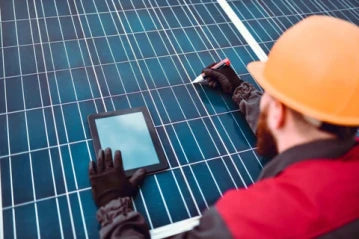
Solar energy is a clean and renewable source of power that has gained significant popularity in recent years. One of the most common applications of solar power is charging batteries, especially for off-grid or backup power systems. In this article, we will explore the factors that determine how long it takes for a 100-Watt solar panel to charge a battery.
Battery Capacity
The capacity of the solar battery plays a crucial role in determining the charging time. Battery capacity is measured in ampere-hours (Ah) and represents the amount of charge the battery can store. A 100-Watt solar panel will deliver a certain amount of current to the battery, which is then used to charge it. To estimate the charging time, you need to consider the ratio of the battery capacity to the charging current.
For example, if you have a 12V battery with a capacity of 100Ah and a 100-Watt solar panel, the charging current can be calculated by dividing the power (Watts) by the battery voltage (V). In this case, the charging current would be approximately 8.33A (100W / 12V). Dividing the battery capacity by the charging current gives you an estimate of the charging time, which in this case would be around 12 hours (100Ah / 8.33A).
The Intensity of the Sun
The intensity of sunlight, which varies throughout the day and in different geographic locations, also affects the charging time of a battery. A 100-Watt solar panel is designed to generate its rated power under standard test conditions, which include a specific solar irradiance level. However, in real-world scenarios, the actual solar irradiance can fluctuate due to factors such as cloud cover, shading, and the angle of the sun.
In locations with ample sunlight and minimal obstructions, a 100-Watt solar panel can generally charge a battery faster. However, if the sunlight is weak or intermittent, the charging time will increase accordingly. It's important to consider your geographical location and the seasonal variations in sunlight when estimating the charging time of your battery.
Defining the Charging Time
To define how long it will take to charge your battery with a 100-Watt solar panel, you need to consider both the battery capacity and the charging current. By dividing the battery capacity by the charging current, you can estimate the charging time in hours. Keep in mind that this is a rough estimate, as various factors can influence the actual charging time.
For instance, the charging efficiency of the battery and the solar charge controller can affect the overall charging speed. Additionally, the initial state of charge of the battery can impact the time required to reach a full charge. It is recommended to consult the manufacturer's specifications and guidelines for the battery and solar panel to get a more accurate estimate of the charging time.
Charging Speed
The charging speed of a 100-Watt solar panel largely depends on the charging current it can provide to the battery. As mentioned earlier, the charging current is determined by the power output of the solar panel divided by the battery voltage. A higher charging current will result in faster charging times, while a lower charging current will extend the charging duration.
To optimize the charging speed, you can consider using multiple solar panels in parallel or selecting a solar panel with a higher wattage. This will increase the charging current and reduce the overall charging time. However, it is essential to ensure that the charging system is compatible with the battery and that the charge controller can handle the increased current.
Considerations before Defining Charging Time
Before defining how long it will take to charge a battery with a 100-Watt solar panel, there are a few key considerations to keep in mind. First, assess your power requirements and choose a battery with an adequate capacity to meet your needs. A battery with a larger capacity will require more time to charge, regardless of the solar panel's wattage.
Additionally, evaluate the amount of sunlight available in your location and consider any obstructions that may affect solar panel performance. Assess the climate conditions and seasonal variations in sunlight to anticipate any fluctuations in charging time.
Conclusion
Determining the charging time of a battery using a 100-Watt solar panel involves considering the battery capacity, the intensity of sunlight, and other factors such as charging efficiency and initial state of charge. While the calculations provide a rough estimate, it is essential to account for real-world conditions and consult the manufacturer's guidelines for more accurate charging time estimates. By understanding these factors, you can optimize your solar charging system and ensure efficient battery charging with a 100-Watt solar panel.

0 Kommentare